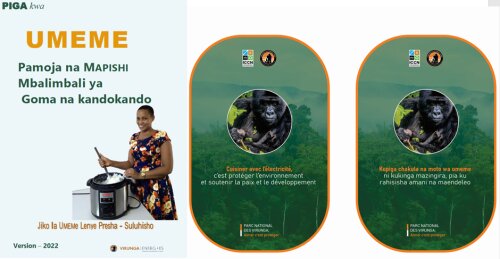Research summary
In this experiment, involving 1,500 households, we ask whether electric cooking can replace cooking with charcoal. We randomly distribute Electric Pressure Cookers (EPC) to households connected to a green electricity grid in Goma where over 90% of the population relies on charcoal for cooking. The majority of charcoal is illegally produced in protected forests and is an income source for armed groups. Due to the high upfront cost of about 70 USD for an EPC, selling the cookers at market price leads to low take up. We use a distribution model with a 100% subsidy provided by Virunga Energies (VE), the green electricity provider. This subsidy is cost-effective for VE: if adoption is sufficiently high, VE can recover the subsidy in less than one year through increased electricity sales. To overcome information gaps and learning costs, we organize demonstration sessions in which beneficiaries learn about the EPCs’ financial and health benefits and can test the cooker. Furthermore, we cross-randomize two additional treatments: (1) a free electricity bundle (5 USD) that allows households to try out the EPC at home free of charge, and (2) an environmental and peace nudge that seeks to increase EPC use by highlighting its social benefits.

Expected results
We expect to be able to test the hypotheses that (1) receiving an EPC along with proper instructions will increase electric cooking and decrease charcoal consumption, (2) receiving a free electricity voucher will increase EPC use, (3) receiving a pro-social nudge regarding the impact of illegal charcoal production will lead to higher environmental awareness and higher EPC use.
Collaborations
Virunga Energies launched the initiative to distribute High Pressure Cookers (HPCs) to its clients. Dr. Sébastien Desbureaux who headed Virunga Foundation’s Monitoring & Evaluation department in 2019-2020 took us on board to design and implement an impact evaluation for this initiative. Sébastien is now a researcher at INRAE and the Centre for Environmental Economics – Montpellier (CEE-M), a research group specialized in environmental and behavioral economics. Together with Sébastien Desbureaux, Prof. Raphael Soubeyran (the director of CEE-M), and Prof. Mathieu Couttenier (Research Chair Investissement d’Excellence and University of Lyon), we co-authored the research proposal that seeks to co-create, with Virunga M&E, the first experimental evidence on eCooker uptake and livelihood impact. The team of Virunga M&E includes among others Natsuno Shinagawa, Jean de la Croix Kembere Mulwahili, and Christine Musharhamina. In January 2022, Lara Collart joined our team as a PhD student. For the supply of eCookers, we collaborate with SESCOM, a Tanzania-based supplier.
Research progress
A pilot study in the fall of 2021 showed that households used the eCooker and increased their electricity consumption considerably. In July 2022, we implemented the baseline survey for an experimental study involving 1,500 households, and in August 2022 a first batch of eCookers and associated cook books were distributed during demonstration sessions. Ambassadors were trained to visit and guide beneficiaries, and collected some data during those visits. On October 3, 2002, we registered our pre-analysis plan. We plan the endline survey in March 2023. A second batch of 500 cookers will be delivered in April 2023. The distribution and demonstration sessions for these cookers will take place in the same month.


Outreach
We are in continuous contact with Virunga Monitoring & Evaluation as well as Virunga Energies and have also presented our research design at Virunga’s Academic Sounding Board, in June 2022. In addition, we presented our research design at “The Sustainable City: An Integrated Perspective”, a Digital Summer School organized jointly by the UAntwerp Urban Studies Institute and the UAntwerp Institute of Environment and Sustainable Development in August 2022. Our research design and first preliminary results were also presented at an internal UAntwerp seminar on November 16, 2022, and a public symposium on ‘energy and inequality’ organized by the Antwerp Interdisciplinary Platform for Research into Inequality (AIPRIL) on December 15, 2022 (a video of the presentation in Dutch can be found here, starting from minute 40).
Funding
The field work for this project is funded by the Fund for Innovation in Development (FID), hosted by the Agence Française de Développement (AFD), from the Centre for Economic Policy Research (CEPR) and the Foreign, Commonwealth & Development Office (FCDO) through its joint research initiative on Private Enterprise Development in Low Income Countries (PEDL) , and through the Labex CEMEB from the I-SITE MUSE in France. The staff, notably the fellowships of Nik Stoop and Lara Collart are funded by The Research Foundation – Flanders (FWO).